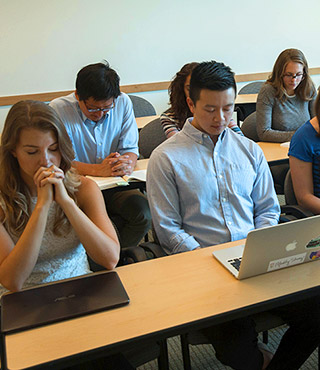Program Description
Research and course work emphasize field and laboratory studies in sedimentology, paleontology, igneous petrology, and geology in health and the environment. Research in paleontology may also be pursued through the M.S. and Ph.D. degree curricula in biology, and through the Ph.D. degree curriculum in earth science.
The Geology Program focuses on field-oriented geology. The integrated core course sequence provides students with the tools to conduct research in the subdisciplines of sedimentology, paleontology, igneous petrology, or environmental geology.
Fieldwork is emphasized because it provides a first-hand experience with geological phenomena that cannot be satisfactorily grasped or understood solely from classroom or laboratory study. Throughout the geology curriculum, students are encouraged to develop an open-minded and investigative approach to the application of the scientific method to the resolution of geologic problems.
Program Length
Two-year track for students with an undergraduate degree in geology. A minimum of 56 quarter units, including 44 at or above the 500 level, constitutes the curriculum for the Master of Science degree in geology.Possible Careers
Geologists study the physical aspects and history of the earth. They identify and examine rocks, study information collected by remote sensing instruments in satellites, conduct geological surveys, construct maps, and use instruments to measure the earth's gravity and magnetic field. They also analyze information collected through seismic prospecting, which involves bouncing sound waves off buried rock layers. Some geologists search for oil, natural gas, minerals, and underground water. Geoscientists play an increasingly important part in studying, preserving, and cleaning up the environment.Application Deadlines
| Quarter | Application Open | Priority Deadline | Final Deadline |
|---|---|---|---|
| Autumn of 2025 | Aug 1, 2024 | Jan 1, 2025 | Jul 31, 2025 |
Expected Cost of Attendance
The following estimated cost of attendance is based on full-time attendance for the number of months enrolled per academic year. Estimated amounts may vary based on a number of factors. Students may use these estimates when applying for financial aid.
Required Program Costs
Academic Year 2025-2026
Other Educational Costs
Non-required costs that can be funded with scholarships/loans.
Notes
- Estimated amounts are for the academic year specified only. Amounts are based on full-time attendance for the number of months enrolled per academic year. International students need to calculate 12 months of living expenses based on these amounts.
- Amounts are expected to increase each year consistent with inflation in the professional education sector.
- To qualify for financial aid, most students must be enrolled at least half time in an aid eligible program and be taking degree requirements. Half time is 6 units in a quarter for undergraduate programs and 4 units in a quarter for graduate programs.


